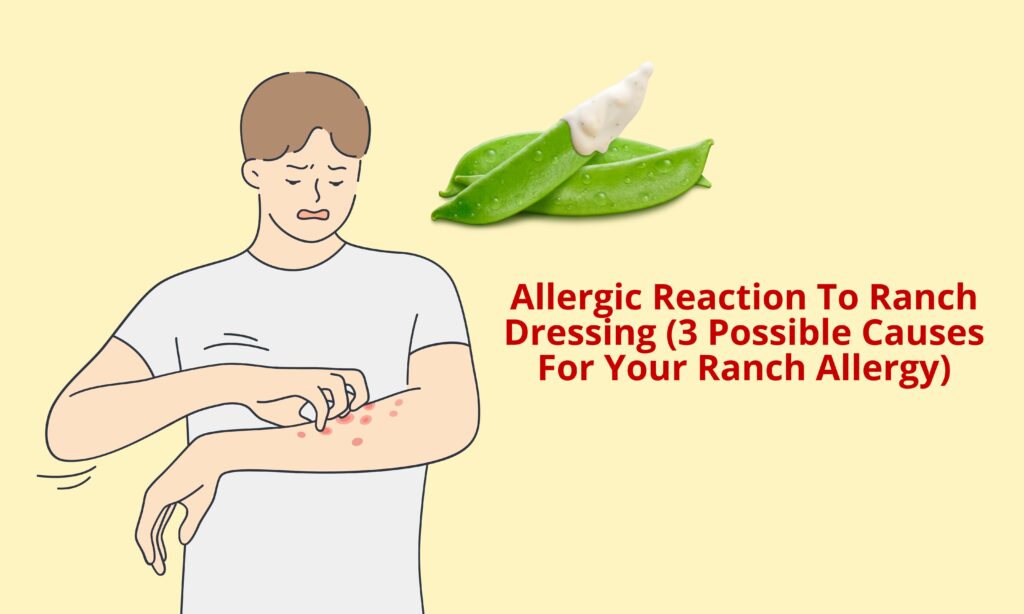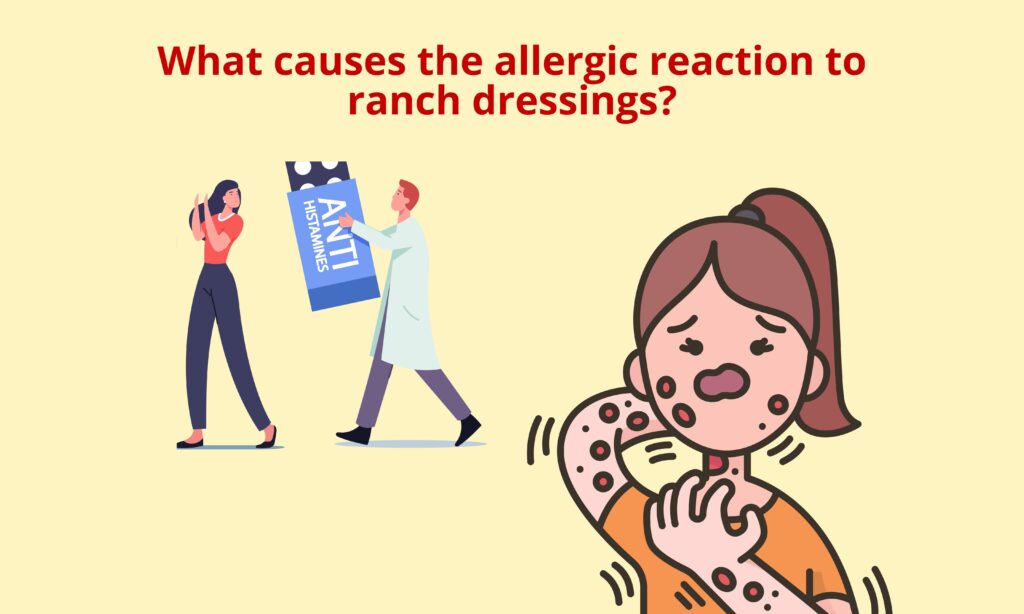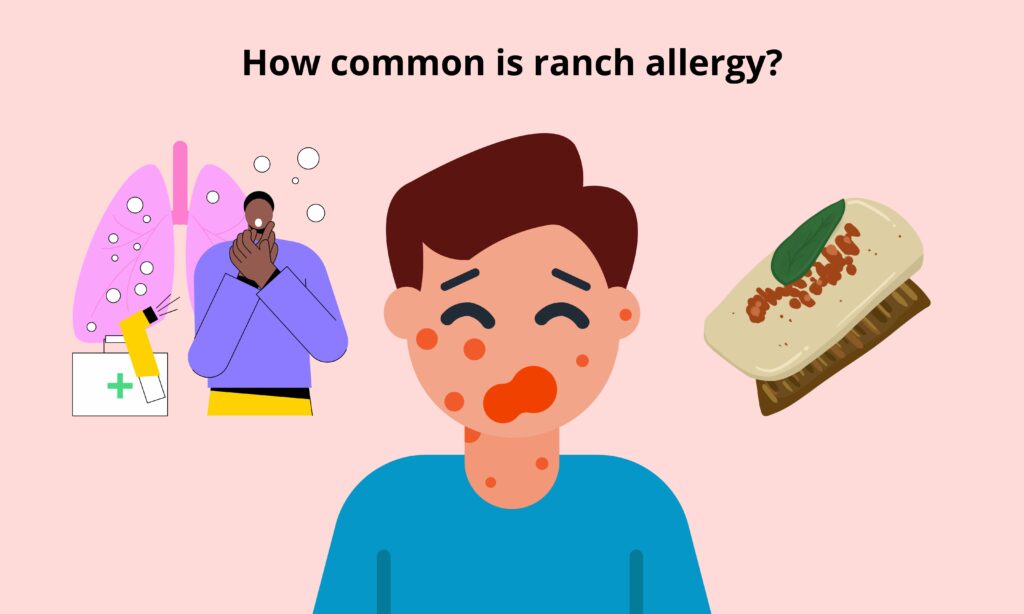
Ranch dressing is a popular condiment that many people enjoy with their salads, vegetables, and even as a dip for snacks. However, some people may experience an allergic reaction to ranch dressing, which can be uncomfortable and even dangerous. In this article, we will explore three possible causes for your ranch allergy.
- Firstly, a ranch allergy could be caused by an allergic reaction to one or more of the ingredients in the dressing. The primary ingredients in ranch dressing include buttermilk, sour cream, mayonnaise, garlic, onion, and a variety of herbs and spices. If you have a food allergy or intolerance to any of these ingredients, consuming ranch dressing could trigger an allergic reaction. Common symptoms of a food allergy include hives, swelling of the face and throat, difficulty breathing, and stomach pain.
- Secondly, a ranch allergy could be the result of cross-reactivity with other foods. Cross-reactivity occurs when the proteins in one food are similar to the proteins in another food, and the body mistakenly identifies them as the same. For example, if you are allergic to milk, you may also be allergic to ranch dressing because it contains buttermilk and sour cream, which are both dairy products. Similarly, if you are allergic to garlic or onion, you may also be allergic to other foods in the allium family, such as leeks, shallots, and chives.
- Thirdly, a ranch allergy could be caused by a sensitivity to food additives. Many processed foods, including salad dressings like ranch, contain preservatives, stabilizers, and artificial flavors that can cause adverse reactions in some people. For example, some people may be sensitive to monosodium glutamate (MSG), a flavor enhancer commonly found in processed foods. Symptoms of a food additive sensitivity can include headaches, flushing, and gastrointestinal upset.
In conclusion, if you are experiencing symptoms of a ranch allergy, it is essential to identify the cause of your reaction. Keeping a food diary and working with an allergist can help you pinpoint the specific ingredient or additive that is triggering your symptoms. Once you know the cause of your allergy, you can take steps to avoid it and prevent future reactions. Remember, if you experience severe symptoms such as difficulty breathing or swelling of the throat, seek immediate medical attention.
What causes the allergic reaction to ranch dressings?

If you have experienced an allergic reaction to ranch dressing, you may be wondering what causes it. An allergic reaction occurs when your body’s immune system overreacts to a substance, such as an ingredient in the dressing. In the case of ranch allergy, there are a few possible causes.
- Dairy products – One cause of ranch allergy is an allergy to dairy products. Ranch dressing typically contains dairy products such as buttermilk and sour cream, which can trigger an allergic reaction in some people. Dairy allergies can cause a range of symptoms, including hives, itching, and gastrointestinal distress. In severe cases, dairy allergies can lead to anaphylaxis, a life-threatening condition that requires immediate medical attention.
- Allergy – Another possible cause of ranch allergy is an allergy to garlic or onion. Many ranch dressings contain these ingredients, which are part of the allium family. Allium allergies can cause symptoms such as itching, hives, and gastrointestinal distress. In some cases, allium allergies can be severe, leading to anaphylaxis.
- A third possible cause of ranch allergy is an allergy to preservatives or other additives in the dressing. Many processed foods, including salad dressings like ranch, contain preservatives, stabilizers, and artificial flavors that can cause adverse reactions in some people. For example, some people may be sensitive to monosodium glutamate (MSG), a flavor enhancer commonly found in processed foods. Symptoms of a food additive sensitivity can include headaches, flushing, and gastrointestinal upset.
It’s important to note that not all adverse reactions to ranch dressing are due to an allergy. Some people may experience intolerance to certain ingredients in the dressing, which can cause discomfort or gastrointestinal upset without involving the immune system. For example, lactose intolerance can cause digestive symptoms such as bloating and diarrhea after consuming dairy products.
If you suspect that you have a ranch allergy, it's important to seek medical attention to confirm the diagnosis and receive appropriate treatment. Your doctor may recommend allergy testing to determine the specific allergen causing your symptoms. Treatment for ranch allergy may include avoiding the allergen, taking antihistamines or other medications to relieve symptoms, and carrying an epinephrine auto-injector in case of a severe reaction.
In conclusion, there are several possible causes of ranch allergy, including dairy products, alliums, and food additives. If you suspect that you have a ranch allergy, seek medical attention to determine the cause of your symptoms and receive appropriate treatment. Avoiding the allergen is key to preventing future reactions and staying healthy.
FAQs

If you or someone you know has experienced an allergic reaction to ranch dressing, you may have many questions about the condition. Here are some frequently asked questions and answers about ranch allergy.
Q: What is a ranch allergy?
A: A ranch allergy is an allergic reaction to one or more ingredients in ranch dressing, such as dairy products, alliums, or food additives. Symptoms can range from mild to severe and may include hives, itching, gastrointestinal distress, and difficulty breathing.
Q: How common is ranch allergy?
A: Ranch allergy is relatively uncommon, but it can occur in people with allergies or sensitivities to the ingredients in the dressing. Dairy allergies and allium allergies are more common than food additive sensitivities.
Q: Can ranch allergy be fatal?
A: In rare cases, ranch allergy can lead to anaphylaxis, a severe and potentially life-threatening allergic reaction. Anaphylaxis requires immediate medical attention and treatment with epinephrine.
Q: What should I do if I have an allergic reaction to ranch dressing?
A: If you experience symptoms of an allergic reaction after consuming ranch dressing, seek medical attention immediately. If you have a known allergy to a specific ingredient in the dressing, avoid consuming it in any form.
Q: How can I prevent a reaction to ranch dressing?
A: The best way to prevent a reaction to ranch dressing is to avoid consuming it if you have a known allergy or sensitivity to any of the ingredients. Read labels carefully and ask questions about ingredients in restaurant dishes.
Q: Can I still eat other types of salad dressings if I have a ranch allergy?
A: Yes, if you have a ranch allergy, you can still enjoy other types of salad dressings that do not contain the allergen. Consider making your own dressings at home using fresh ingredients.
In conclusion, ranch allergy is a relatively uncommon but potentially serious condition that can be caused by allergies or sensitivities to ingredients in the dressing. If you have a known allergy, it is essential to avoid consuming ranch dressing or any other foods that contain the allergen. If you suspect that you may have a ranch allergy, seek medical attention to confirm the diagnosis and receive appropriate treatment.
Conclusion
In conclusion, ranch allergy is a real and potentially serious condition that affects some people who consume ranch dressing. The allergy can be caused by a range of ingredients, including dairy products, alliums, and food additives. Symptoms can range from mild to severe, and in some rare cases, ranch allergy can even be fatal.
If you suspect that you have a ranch allergy, it’s essential to seek medical attention to confirm the diagnosis and receive appropriate treatment. Your doctor may recommend allergy testing to determine the specific allergen causing your symptoms. Treatment for ranch allergy may include avoiding the allergen, taking antihistamines or other medications to relieve symptoms, and carrying an epinephrine auto-injector in case of a severe reaction.
Preventing ranch allergy is key to avoiding symptoms and staying healthy. If you have a known allergy to any of the ingredients in ranch dressing, avoid consuming it in any form. Reading labels carefully and asking questions about ingredients in restaurant dishes can also help prevent accidental exposure to the allergen.
If you have a ranch allergy, you can still enjoy other types of salad dressings that do not contain the allergen. Consider making your own dressings at home using fresh ingredients. And if you do experience symptoms of an allergic reaction, seek medical attention immediately to ensure prompt and appropriate treatment.
Overall, while ranch allergy is relatively uncommon, it’s important to be aware of the condition and take steps to prevent exposure to the allergen if you have a known allergy or sensitivity. By being proactive and working with your doctor, you can manage your ranch allergy and stay healthy.